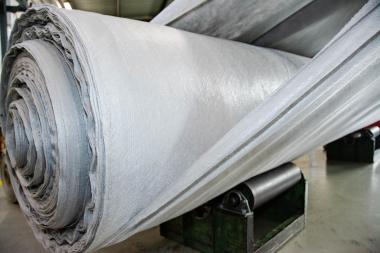Beaulieu International Group at International Conference on Geosynthetics
Beaulieu International Group will turn the spotlight on geotextile products with sustainability benefits to support progress in resilient civil engineering projects at the 12th ICG Rome from 18th -21st September 2023, presenting options to target fossil carbon reduction by choosing PP-based staple fibres or woven geotextiles that are among the lowest in carbon footprint for geosynthetics.
For manufacturers of nonwoven geotextiles, Beaulieu Fibres International (BFI) offers PP fibres with > 25% carbon footprint reduction compared to the European standard PP fibres, generating 1.48 kg CO2/kg PP fibres. A step further is to accelerate the replacement of fossil carbon in engineered fibre applications by choosing its ISCC Plus certified bio-attributed MONO-PP with a negative carbon footprint.
For construction projects, nonwoven geotextiles made with high-tenacity HT8 fibres are proven to secure a longer service lifetime and reduce the environmental impact, as they offer high mechanical performance at a reduced weight.
Beaulieu Technical Textiles' (BTT) woven geotextiles provide a wide range of functions, including separation, filtration, reinforcement and erosion control, and are among the most sustainable in the industry. Depending on weight, the carbon footprint of its woven geotextiles (m²) ranges between 0.37 and 1.40 kg CO2 eq./m². They also minimize the use of natural resources for more sustainable infrastructure development. Case studies such as at the Ostend-Bruges airport highlight significant CO2 reduction on the jobsite by replacing the transport of 960 trucks of gravel with 3 trucks of woven geotextiles, and by extending the runway’s life span.
The ICG launch of its new line Terralys MF woven filtration geotextiles with monofilament boosts the performance of a common solution in building layers that require high water flow rates. High-tenacity extruded polypropylene tapes and monofilaments are interwoven to form dimensionally stable and highly permeable geotextiles. These new filtration geotextiles provide greater resistance to dirt and biological clogging. They allow water to travel freely while reducing soil erosion when employed as a separation and stabilizing layer.
As of September 2023, all PP staple fibres and woven geotextiles will have Environmental Product Declarations (EPD) based on LCAs. Each EPD is an essential tool for communicating and reporting on the sustainability performance and helps carbon-conscious customers in their purchasing and decision making. Registered EPDs are globally recognized, publicly available and free to download through EPD Libraries.
Beaulieu International Group









